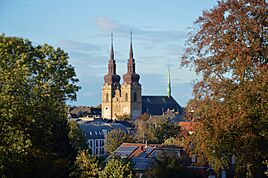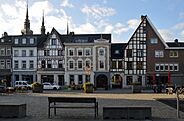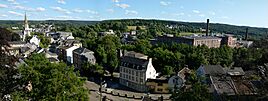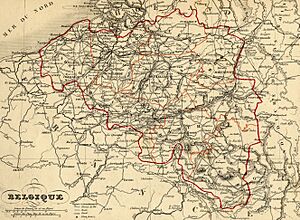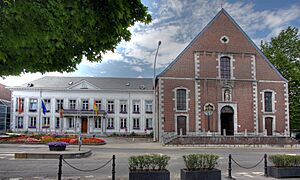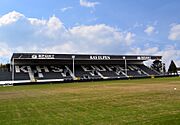Eupen facts for kids
Quick facts for kids
Eupen
|
|||
|---|---|---|---|
|
City Parish Church of Saint Nicholas
Friedenskirche
Klötzerbahn street
Malmedyerstraße
Haus Grand Ry
View of Eupen from Moorenhöhe
|
|||
|
|||
| Country | Belgium | ||
| Community | German-speaking Community | ||
| Region | Wallonia | ||
| Province | Liège | ||
| Arrondissement | Verviers | ||
| Area | |||
| • Total | 103.74 km2 (40.05 sq mi) | ||
| Population
(2018-01-01)Lua error in Module:Wd at line 1575: attempt to index field 'wikibase' (a nil value).
|
|||
| • Total | Lua error in Module:Wd at line 1,575: attempt to index field 'wikibase' (a nil value). | ||
| Postal codes |
4700, 4701
|
||
| Area codes | 087 | ||
| Website | www.eupen.be | ||
Eupen is an important city in Belgium. It is the capital of the German-speaking Community of Belgium, where German is the main language. Eupen is located in the Liège Province, not far from the borders with Germany (near Aachen) and the Netherlands (near Maastricht). It's also close to a beautiful nature area called the "High Fens" in the Ardennes. Eupen is also a key city in the Meuse-Rhine Euroregion, which connects different countries.
Eupen was first mentioned in 1213. Over many centuries, it was part of different powerful regions. These included the Duchy of Limburg, Brabant, Burgundy, the Holy Roman Empire, and France. In 1815, after a big war, Eupen became part of Prussia. Prussia later joined to form the German Empire in 1871.
After World War I, in 1919, the Treaty of Versailles changed things. Eupen and a nearby town called Malmedy were moved from Germany to Belgium. Today, German is still the official language in Eupen. The city is home to a small university, the Autonome Hochschule Ostbelgien. It offers degrees in teaching and nursing. In 2010, Eupen's football team, K.A.S. Eupen, became the first club from the German-speaking Community to play in Belgium's top football league.
As of January 1, 2006, Eupen had about 18,248 people living there. The city covers an area of about 103.74 square kilometers. This means there are about 176 people living in each square kilometer.
Contents
Eupen's Past: A Journey Through History
Early Beginnings and Changes
Eupen and its St. Nikolaus Chapel were first mentioned in 1213. At that time, they were part of the Duchy of Limburg. In 1288, after a battle, the Duchy of Limburg joined with Brabant.
Later, in 1387, Brabant and Limburg were inherited by Burgundy. Eupen was even burned down during a war against the Guelders. In 1477, the Austrian Habsburgs took over Burgundy. They then gained control of Eupen, along with Limburg and Brabant.
Under Habsburg and German Rule
In 1544, the Habsburg Holy Roman Emperor Charles V gave Eupen a special right. This allowed the town to hold two markets each year. In 1555, Brabant and Limburg became part of the Spanish Habsburgs' lands. Ten years later, Protestantism was first mentioned in Eupen.
During the Dutch Revolt against the Spanish Habsburgs in 1582, rebels burned Eupen. However, they did not take control of the town. A terrible disease, the Bubonic plague, hit Eupen in 1635. This had very sad results for the people.
Eupen got its own court of law in 1648. In 1674, it officially became a city. This gave Eupen more recognition and freedom to govern itself. Six years later, making textiles (like cloth) became an important industry in the city.
In 1713, the Treaty of Utrecht returned Brabant and Limburg to the Austrian Habsburgs. Then, in 1794, during the French Revolution, Revolutionary France took over Eupen. It became part of a French region called Département Ourthe.
After the Congress of Vienna in 1815, Eupen became part of Prussia. All Prussian lands later joined to form the German Empire in 1871. During this time, Eupen became popular as a spa town, a place where people went for health and relaxation.
A weaver named 'Schunck' was working in Eupen as early as 1776. His family continued the weaving business. One of his grandsons, Arnold, later started a famous company called Schunck in a different town.
Eupen in the 20th Century
After World War I, the Treaty of Versailles in 1919 changed Eupen's ownership. Eupen and nearby Malmedy were transferred from Germany to Belgium. This change led to some groups in Eupen supporting the National Socialists.
From 1938 to 1950, the Vesdre Dam was built, creating Lake Eupen. In 1940, Nazi Germany invaded Belgium. Eupen and Malmedy were taken back by Germany. In September 1944, American soldiers reached Eupen. The city became a place of intense fighting during the Battle of the Bulge.
In 1949, the left tower of the St Nikolaus Church was damaged by fire. The city center was also affected by flooding in 1953. In 1976, Eupen merged with the nearby town of Kettenis, even though some people in Kettenis were against it.
In 1980, after some changes in Belgium's government, the German-Speaking Community of Belgium was officially created. Eupen was chosen as its capital city.
Eupen's Weather and Climate
Eupen has a cool oceanic climate, but it also gets some influences from the continent. This is because it's higher up than most of Belgium. Eupen also gets more rain and clouds than Liège, a city in the valley to the west. This happens because of the higher elevation.
Because of the elevation and frequent winter frosts, Eupen gets a good amount of snow for Belgium. On average, it has 16 "ice days" each year. An ice day means the temperature stays below 0 degrees Celsius (32 degrees Fahrenheit) all day. It also has about 71 "frost days" each year.
| Climate data for Eupen (1991–2020 normals) | |||||||||||||
|---|---|---|---|---|---|---|---|---|---|---|---|---|---|
| Month | Jan | Feb | Mar | Apr | May | Jun | Jul | Aug | Sep | Oct | Nov | Dec | Year |
| Mean daily maximum °C (°F) | 3.9 (39.0) |
4.8 (40.6) |
8.6 (47.5) |
13.0 (55.4) |
16.8 (62.2) |
19.8 (67.6) |
21.8 (71.2) |
21.5 (70.7) |
17.7 (63.9) |
13.0 (55.4) |
7.9 (46.2) |
4.5 (40.1) |
12.8 (55.0) |
| Daily mean °C (°F) | 1.4 (34.5) |
1.8 (35.2) |
4.8 (40.6) |
8.2 (46.8) |
11.9 (53.4) |
14.9 (58.8) |
16.9 (62.4) |
16.6 (61.9) |
13.2 (55.8) |
9.5 (49.1) |
5.2 (41.4) |
2.1 (35.8) |
8.9 (48.0) |
| Mean daily minimum °C (°F) | −1.1 (30.0) |
−1.2 (29.8) |
0.9 (33.6) |
3.4 (38.1) |
7.1 (44.8) |
10.0 (50.0) |
12.1 (53.8) |
11.7 (53.1) |
8.8 (47.8) |
5.9 (42.6) |
2.5 (36.5) |
−0.2 (31.6) |
5.0 (41.0) |
| Average precipitation mm (inches) | 114.2 (4.50) |
99.9 (3.93) |
94.4 (3.72) |
69.1 (2.72) |
86.9 (3.42) |
98.2 (3.87) |
103.6 (4.08) |
110.2 (4.34) |
98.6 (3.88) |
91.4 (3.60) |
101.0 (3.98) |
128.2 (5.05) |
1,195.7 (47.09) |
| Average precipitation days (≥ 1 mm) | 15.0 | 13.6 | 13.5 | 11.0 | 12.5 | 12.1 | 13.0 | 12.6 | 11.7 | 12.9 | 14.5 | 16.9 | 159.3 |
| Mean monthly sunshine hours | 53 | 74 | 123 | 173 | 193 | 197 | 205 | 197 | 150 | 107 | 60 | 44 | 1,576 |
| Source: Royal Meteorological Institute | |||||||||||||
Eupen's Culture and Fun Activities
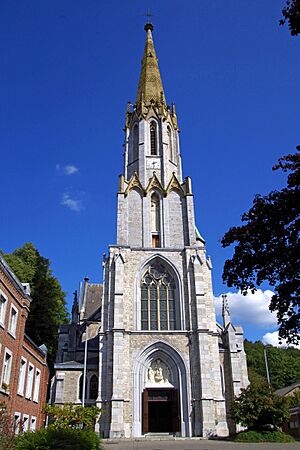
Eupen has many interesting cultural spots and events:
- Rhenish Carnival: A lively festival that happens around Rosenmontag (Rose Monday).
- Municipal Museum: Located on Gospertstrasse, it shows the history of the city.
- IKOB: Museum of Contemporary Art: This is a museum for modern art.
- Christian Silvain Foundation: Here you can see a permanent display of paintings.
- BRF: This is the public radio and TV station for the German-speaking Community of Belgium.
Sports in Eupen
K.A.S. Eupen is the city's main football (soccer) club. It was started in 1945. They play their games at the Kehrwegstadion, which can hold 8,000 fans. In 2010, K.A.S. Eupen made history. They became the first club from the German-speaking Community to play in Belgium's top football league. They were relegated after one season but returned to the top league in 2016.
Famous People from Eupen
Many interesting people have come from Eupen. You can find a list of them in the category link above.
See also
 In Spanish: Eupen para niños
In Spanish: Eupen para niños
 | Emma Amos |
 | Edward Mitchell Bannister |
 | Larry D. Alexander |
 | Ernie Barnes |


